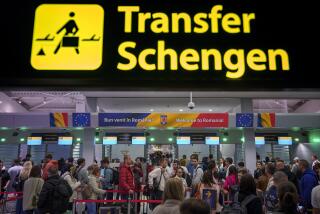Black Markets Thrive as East Bloc Economies Evolve : Europe: Weak local currencies and persistent shortages of food and consumer goods make illegal trading a sort of temporary lifeline.
- Share via
BUCHAREST, Hungary — On a drab Bucharest street, an 8-year-old boy hawks beer for twice the price it was intended to sell for in the empty shop it failed to reach. Nearby, his father buys dollars from tourists at an inflated exchange rate.
From a car in Sofia’s bitpazar market, a dealer sells sugar and soap powder, which have long vanished from the dreary stores of the Bulgarian capital, where they once cost a third of today’s price.
In Budapest, visitors from all over Eastern Europe hawk consumer goods that are either unavailable or too expensive in Hungarian stores. Poles, Russians and Vietnamese are changing money on the streets of Prague.
The dark days of communism may have passed and Eastern Europe may be moving toward capitalism, but black markets are thriving in the region as its people struggle with weak local currencies and shortages of food and consumer goods during the painful transition to a market economy.
Poland and Yugoslavia, which have opted for economic shock therapy, have virtually wiped out their once-rampant currency black markets in a single stroke through reforms that made their currencies convertible.
However, while the new democratic governments of Czechoslovakia and Hungary have a clear commitment to the market, shortages persist and the black market economy could remain a lifeline for their citizens until the new system is firmly in place.
Romania and Bulgaria, ruled by former communists, have an ambivalent attitude toward market economy. As they hesitate to dismantle inefficient state sectors, black market activity is running wild and the governments seem at a loss in coping with it.
“I’m really glad the Socialist (formerly Communist) Party won the Bulgarian elections,” said Todor, a black market dealer in Sofia’s bitpazar, a bazaar where everything from baby food to car parts changes hands at inflated prices.
“This is the only system under which my business could survive. Soaring inflation, empty shops and hungry people are the best possible conditions for my business,” he said.
Bulgaria is bringing back rationing in response to dire shortages of essentials such as sugar, cooking oil and detergent. “These things are the real currency in Bulgaria,” said the black marketeer. “Without them you are a poor man.”
Despite recent crackdowns by Romanian police, similar markets have sprouted along the streets, providing clothes, food, electronic goods and other luxuries brought in from abroad or illegally diverted from Romanian factories.
The police arrested 1,500 black marketeers last month, but the trade continues to grow, and the government is drafting new laws to regulate it, ranging from the mundane to the bizarre.
Romanian customs recently seized 100 pounds of mercury from Romanian travelers crossing into Turkey.
The valuable mercury could have been sold for a handsome sum in Istanbul, where the travelers could have bought jeans, cigarettes and cosmetics--prized products in short supply back home.
Long lines of cars form in Romanian towns to buy gasoline. Line-jumpers discreetly hand the pump attendant a couple of packets of Kent cigarettes, Romania’s stablest currency, and, as if by magic, their tank is filled.
Bulgarians hop across the border into Yugoslavia to top off their tanks because fuel is often virtually impossible to buy at home.
Tourists get seven Bulgarian leva for one U.S. dollar at official exchange offices, while on the street they can get 11 leva.
The dollar officially fetches 20 Romanian lei, but the black marketeers give up to 140 lei per dollar.
Romanians line up outside travel agents and banks for the $75 worth of hard currency they are allowed once in two years for traveling abroad. Many of them immediately change it into lei on the black market.
The currency weakness in both countries gives racketeers a field day, enabling them to grow rich overnight.
One returned Romanian emigrant, using lei obtained at the black market rate, bought tons of furniture cheaply, shipped it to Sweden for sale and became an instant millionaire.
In Czechoslovakia, the black market turns over an estimated $200-million worth of hard currency per year, more than the country’s income from organized tourism.
But the exchange rate difference has steadily narrowed, and the government has introduced currency auctions as a first step toward creating a regular foreign exchange market.
Demand for hard currency is high among Czechoslovaks, who are officially allowed only 100 West German marks (about $65) per year for travel abroad.
More to Read
Sign up for Essential California
The most important California stories and recommendations in your inbox every morning.
You may occasionally receive promotional content from the Los Angeles Times.













